A controversial bill that would abolish direct elections for local mayors and governors in Indonesia is drawing strong criticism in the world’s third-largest democracy. Critics say laudable democratic gains made over the past decade would be curtailed under the proposed law.
Just two months after Indonesia elected former small-town mayor and later Jakarta governor, Joko Widodo, to be their next president, the country’s parliament is considering abolishing direct elections at the local level.
If approved, the bill would see local mayors and governors elected by political parties rather than directly by the people.
Direct elections for regional leaders have been in place since 2005 and have been credited with generating a handful of visionary new leaders, including president-elect Widodo.
But advocates of the proposed new law said direct local elections were inefficient, costly and foster corruption.
Fadli Zon, vice chairman of the Gerindra Party, told a panel discussion in Jakarta on Wednesday why his party was backing the bill.
“There is heavy campaign burden. At least the campaign in each pilkada or regional direct election is 30-35 billion [Indonesian rupiah = $2.9 million] and I think this is only the expense of the KPU, the elections committee, this is not even the campaign expenses, witness expenses, success team expenses, and so on,” he said.
Zon said the total cost of directly electing mayors and governors at the local level amounted to $5 billion (59.53 trillion rupiah).
As candidates routinely hand out bribes to win a seat - in some cases exhausting their entire life savings to be elected - advocates say abolishing direct local elections would curb graft, and the number of cases of electoral fraud heard by the Constitutional Court.
While critics agree that Indonesia’s somewhat boisterous democracy is expensive to fund, they argue that reducing the capacity of people to directly elect their local leaders would undermine the country’s political progress.
Analysts said abolishing direct local elections only shifts the problem of corruption. Instead of bribes paid to voters they will be paid to parties instead if this law passes.
Sarwono Kusumaatmadja, a senior advisor for government affairs at the public policy group Transformasi, said the proposed law would benefit existing party structures.
“It won’t change the nature of politics, it won’t make politics any cleaner. It will only shift the money politics somewhere else, to the oligarchs, and the victims are the Indonesian people,” said Kusumaatmadja.
Post-Suharto reforms
After former dictator Suharto stepped down in 1998, Indonesia has embarked on a comprehensive process of reform and decentralization.
Each election that has followed has seen Indonesian voters become increasingly engaged and political debates more substantive.
When president elect Widodo is inaugurated this October it will be the first time power will be handed over from one directly elected leader to another in Indonesia - a claim that cannot be made by regional neighbors Malaysia, Singapore and Cambodia.
Within Southeast Asia, Indonesia is now being hailed as a democratic success story.
Titi Anggraini, director of the Association for Elections and Democracy (Perludem), said the debate over this bill was about consolidating Indonesian democracy and strengthening civil society participation.
“The direct local election will make the regional heads more responsible to the people… And the direct elections will give the people opportunity to hold regional heads accountable,” said Anggraini.
Critics have also criticized the timing of the push to pass the bill, just weeks before Widodo, who opposes the bill, comes into office.
The bill is being supported by the political coalition of losing presidential candidate, Prabowo Subianto, which holds a majority in parliament.
The final vote may come down to outgoing president Susilo Bambang Yudhoyono, who must approve the legislation before it becomes law.
In a recorded statement posted on Youtube, President Yudhoyono did not come out harshly against the bill, but he did say direct elections should be maintained.
Lawmakers are expected to vote on the proposed law on September 25.




